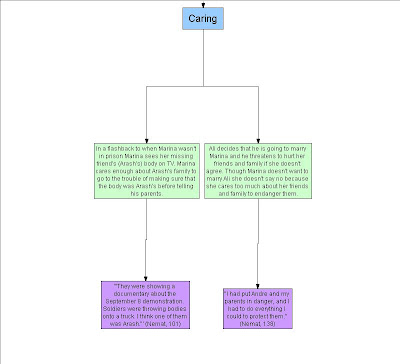Dear Marina Nemat,
I was assigned to read your book, Prisoner of Tehran, for a school project. I love to read and have read many books in the past but if I hadn’t been assigned your book I probably would never have considered reading it. I like to read fiction books because when reading a story that has been made up I always know that no matter how bad things get they aren’t real. Also with fiction books the author can always give the readers a happy ending since the author has total control over the story whereas in real life not all stories end in happily ever after. I think one the reasons I love to read is to witness happy endings (even when they aren’t very plausible) so as soon as I’m about a quarter of the way through any book I have a tendency to skip right to the end and make sure the book has a happy ending before continuing.
Your book is very different than most of the other books I’ve read. Your story is amazing yet terrifying at the same time. Being a sixteen year old girl I could never imagine going through any one of the horrors that you went through at my age, let alone more than one. You came face to face with death so many times in Prisoner of Tehran while I’ve never even attended a funeral. Many of your friends died, you almost died and you lost your husband and child, “My baby was dead. I would have loved him if he had lived.” (Nemat, 231) I’ve lived a very privileged and, what you could call, an easy life. Because of this when reading Prisoner of Tehran there were many times when I wasn’t able to believe that what I was reading was not just a story but actually someone’s life: your life.
From having the privilege of meeting you and hearing you retell your story I learned why you and your husband chose to come to Canada. I learned that you made this choice because you had heard good things about Canada but also because you already had some family living here. I’ve never moved further than a few blocks down the street but by listening to my mother’s stories about her life I can just begin to understand how hard it must have been to leave Iran and start a new life in a foreign country. My mother immigrated to Canada with her family when she was a teenager from her home in Guyana. When my mother left Guyana there was a political conflict going on similar to in Iran. When her family left they had to leave behind most of their money and belongings similarly to what you had had to do, “It was against the law to take antiques, too many pieces of jewellery, or large sums of money out of the country.” (Nemat, 273) This made their lives very difficult at first in Canada but, also like you, they had some family already living in Canada to help them rebuild their lives.
At the end of Prisoner of Tehran you quote some Canadian students saying, ‘“I can’t wait to get to Toronto”’. (Nemat 274) I can easily understand and relate to these students because I know how it feels to return home after being far away and no matter where you go there is nothing as nice as returning home. Though you and I are very different this is one thing we have in common because we are both Canadians.
I believe that Canada is a great country to get a new and fresh start to your life and to be able to put your past behind you and move forward. The fact that you choose to instead reflect on your past and write the book Prisoner of Tehran was a choice that is very inspiring to see. To be able to write your story and share it with the rest of the world must have taken huge amounts of strength and courage. If I had gone through your past struggles I don’t think I would’ve been able to face the past like you did. As one of your readers I owe you a great thank you for sharing your story with me.
Sincerely,
Andie

















